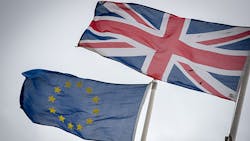From London to Paris to Tokyo, business leaders reacted with dismay to the U.K.’s vote to leave the European Union, with some of them warning the decision would slow economic activity and prompt them to reduce investments in the country.
As the pound and stocks plunged Friday in response to the vote, companies in industries like travel, advertising and automobiles, which are heavily exposed to swings in currencies, said they would reassess their strategies. International Consolidated Airlines Group SA, the parent company of British Airways, was among the first to quantify the vote’s impact, warning that the decision will reduce profit growth this year.
“This is a lose-lose result for both — Britain and Europe,” said CEO Thomas Enders of Airbus Group SE, which makes wings for its aircraft in the U.K. “Britain will suffer, but I’m sure it will focus even more now on the competitiveness of its economy vis-a-vis the EU and the world at large. But, of course, we will review our U.K. investment strategy, like everybody else will.”
For U.K. voters, Brexit may have been about local concerns, but the responses from corporate leaders underline the global impact of the first departure from the 28-nation bloc. The “leave” vote could slow everything from car buying to ad spending to the flow of tourists to Mediterranean beach resorts, prompting companies to divert investments and review employment levels in the U.K. and beyond. Prior to the vote, most corporate leaders who had spoken out on the issue had expressed support for remaining in the EU.
The result sent stock prices plunging across Europe, with French automaker Renault SA losing as much as 20% and Spanish phone operator Telefonica SA, which has been trying to sell its O2 wireless unit in the U.K., dropping 19%.
Among the hardest hit in the U.K. were retail chains such as electronics merchant Dixons Carphone Plc, book retailer WH Smith Plc, apparel seller Next Plc and Associated British Foods Plc, owner of budget fashion retailer Primark. Shares of all of those companies fell more than 30% before paring losses.
Advertising spending, which reacts quickly to economic swings, could experience a two- or three-year “rollercoaster” ride in Europe, said Maurice Levy, chief executive officer of Paris-based marketing giant Publicis Groupe SA. That could cause the company to rethink its U.K. investment plans, he added.
“We could have set up some centers in the U.K.,” he said. “Now, it’s out of the question. The advertising market will surely suffer.”
Swiss watch brand H. Moser & Cie., which has three stores in the U.K. and gets about 5% of its revenue from the country, already is considering reducing spending, said CEO Edouard Meylan.
“We don’t want to panic and we think it will stabilize, but should the pound keep falling or stay like this, we might cut advertising in the U.K.,” he said.
Automaker Earnings Could Plummet
The U.K. withdrawal could cut carmaker earnings by more than 8 billion euros ($8.9 billion), reduce sales in the country by about 14% and cause a 2.5% decline in vehicle production in the EU in 2017, Arndt Ellinghorst, a London-based analyst for Evercore ISI, wrote in a note.
The plunge in the pound could put pressure on Asian automakers, along with car- and electronics-parts makers, making their exports less competitive. Hankook Tire Worldwide Co. of South Korea will respond by “diversifying global production capability,” said Vice President Park Hyun Min. Japanese car-parts maker Exedy Corp. may have to consider moving its U.K. office to continental Europe, board member Hiroshi Toyohara said.
IAG, as the owner of British Airways and Iberia is known, will be worst hit among airlines, according to a note from RBC Capital Markets, because it is heavily focused on London Heathrow airport. IAG dropped as much as 34%, the biggest intraday decline on record.
For U.K. travelers, air fares will go up and vacations will become more expensive, said Kenny Jacobs, marketing chief at low-cost carrier Ryanair Holdings Plc, which had lobbied for remaining in the EU. Brexit could change the dynamics of air travel, with passengers on trans-Atlantic routes possibly choosing Dublin rather than London as an entry point to Europe, he said on Bloomberg Television.
U.K.-based low-cost carrier easyJet Plc said it will lobby the government to try to keep the country in the European single aviation market after it leaves the EU.
Companies that export from the U.K. could get a short-term boost from the weaker pound. “If the pound gets cheaper, it is a big advantage for us as the manufacturing costs can go down,” said Yoshihisa Kainuma, president of Minebea Co. of Japan, a maker of ball bearings and industrial motors that has a plant in Lincoln, England.
Even with share prices plunging and the pound in free-fall, some companies were relatively insulated. Burberry Group Plc, which has been beaten down in recent months, fell 2.3% at 10:50 a.m. in London — compared with a 5% drop in the FTSE 100 index — on expectations that a weaker pound could spur sales of the company’s trench coats and other fashions.
Simon Wolfson, the CEO of apparel retailer Next, whose shares were down 9%, called the market reaction “far more extreme than that of the man on the street.” Wolfson said he had voted in favor of leaving the EU.
While Domino’s Pizza Group Plc shares dropped as much as 7.9%, CEO David Wild says his business is in good shape to weather any slowdown in consumer spending.
“People will still want to eat pizzas,” he said.
By Eric Pfanner, with assistance from Richard Weiss, Naomi Kresge, Matthew Boyle, Alexandre Boksenbaum-Granier, Sohee Kim, Masatsugu Horie, Kiyotaka Matsuda, Chris Cooper, Sam Chambers, Stefan Nicola and Corinne Gretler.
About the Author
Bloomberg
Licensed content from Bloomberg, copyright 2016.
